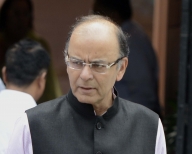
New Delhi– Indian Finance Minister Arun Jaitley’s attempt to boost the rural economy, affordable housing and infrastructure got thumbs up from majority of India Inc, a few others remained apprehensive about the imposition of excise duty on jewellery products.
Here is businessmen said about Budget 2016-17:
Harshavardhan Neotia, president, Federation of Indian Chambers of Commerce and Industry
The finance minister has made a strong attempt to pump prime the rural economy and the infrastructure sector. This would yield dividends and we foresee a multiplier effect in the form of demand generation and employment creation over time. The state of the agriculture sector on account of two consecutive years of monsoon failure was precarious and it deserved the attention that was needed. Additionally, we see a lot of emphasis on affordable housing segment which will also result in forward and backward linkages and thus propel growth.
Sumit Mazumder, president, Confederation of Indian Industry
We believe that the focus on macroeconomic stability, boosting domestic demand and continued economic reforms would further cement India’s position as a haven of growth in a fragile global economy. Low-cost housing will be a huge demand multiplier, and CII welcomes the many initiatives on this.
Sunil Kanoria, Associated Chambers of Commerce and Industry of India
Realising well the limitations brought in by slow demand and global slowdown, the budget has rightly put emphasis on creation of employment through Start-Up India and Skill Development. However, rationalisation of and simplification of tax rates would have benefited the overall ease of doing business, especially keeping in mind that GST implementation seems to have been pushed ahead.
Mahesh Gupta, president, PHD Chamber of Commerce and Industry
We are happy that our suggestion to increase deduction on exemption for income tax on interest paid on home loans has been partly accepted as there is an additional exemption of Rs.50,000 for housing loans up to Rs.35 lakh, provided cost of house is not above Rs.50 lakh which will give a boost to the real estate sector.
Moody’s
Looking ahead, the 2016-17 budget target appears to recognize that pressures on the expenditure side are mounting, given the significant costs of funding government employee wages and benefits, as well as bank recapitalization costs.
Praveenshankar Pandya, chairman, Gems and Jewellery Export Promotion Council
We are apprehensive of the introduction of excise duty on jewellery products for the first time in several decades. In India, jewellery is largely produced by the SMEs and they are not equipped to follow the rigid compliance of excise norms. The imposition of excise would severely impact jewellery production in India resulting in loss of employment to the uneducated but skilled jewellery workers.
Pratik Agarwal, vice chairman, Sterlite Grid and director, infrastructure business at Vedanta Resources
The revised tax framework on Infrastructure Trust (InVit) will exempt Dividend Distribution Tax (DDT) in respect to distributions made by SPVs to the infrastructure trusts. Infrastructure trusts are one the most efficient vehicles to attract equity from long term investors like pension funds, insurance companies and other institutional investors. We feel that the amendment introduced in this budget will encourage developers to pursue their InvIT listing plans.
Sunil Duggal, CEO, Dabur India
I am quite happy with the government continuing the rural focus and looking at enhancing allocation to MNREGA (Mahatma Gandhi National Rural Guarantee Act), besides focusing on skill development for the rural populace. These initiatives would help promote entrepreneurship among the rural populace, add jobs and put more disposable income in the pockets of the rural consumer, improving their standards of living and ensuring continued rural demand for branded consumer goods.
Kamlesh Rao, CEO, Kotak Securities
Union Budget 2016 has struck a fine balance between fiscal prudence and providing growth boosters to the economy. Higher securities transaction tax on options could be a cause of concern as it pushes up the cost for derivative participants.
Subho Ray, president, Internet & Mobile Association of India (IAMAI)
The association has welcomed the proposal to set up a dedicated e-marketing platform for agriculture and hopes that the innovation of the digital industry will be harnessed for this. The association has also welcomed move to expand the digital literacy scheme in rural India and setting up of a Higher Education Financing Agency.
Anuj Puri, chairman and country head, JLL India
While three of the real estate sector’s major expectations – increased house rent allowance deduction, removal of dividend distribution tax (DDT) from real estate investment trusts (REIT) and boost to affordable housing by allowing 100 percent deduction on profits made by entities constructing them – have been addressed, the Budget offered no financial protection from project delays to home buyers. The biggest announcement with implications for the real estate sector in India was removal of DDT from REIT.
Krishna Kumar Karwa, managing director, Emkay Global Financial Services
From a capital market perspective, there is a huge sense of relief that long term capital gains tax is status quo. However increased securities transaction tax on options and dividend tax on above 10 lakh dividend receipts is disappointing. The allocation of Rs.25,000 crore for bank recapitlisation is slightly disappointing though the finance minister has assured that if required they will provide more resources.
Shivendra Bajaj, executive director, Association of Biotechnology Led Enterprises, Agriculture Group (ABLE-AG)
Although the soil health card scheme, Fasal Bima Yojana and common e-market platform will help in improving the agriculture sector in the country, it is disappointing to see no encouragement for agri-biotech research by public or private institutions for augmenting the sector.
Manish Sharma, president, Consumer Electronics and Appliances Manufacturers Association, and managing director, Panasonic India and South Asia
We are happy with the government impetus on Make In India by providing tax and duty benefits and these will go a long way in strengthening the manufacturing capabilities of India. Another important milestone has been the use of technology to increase accountability of the government, authorities, and courts is a welcome step and will provide the right fillip to fast track procedures and will become the growth engine of the country.
Bhairav Dalal, partner- Tax, PwC India
‘Housing for all’ seemed to be the flavour of the real estate part of budget today. The direct and indirect tax benefits for affordable housing should catapult the smart city initiative. Additional deduction of interest would incentivise the first home buyers to own the houses.
Vinay Khattar, senior vice president and head of research, Edelweiss Broking
A stable fiscal picture with appreciable spending on infrastructure and a consumption boost from pay commission, OROP (One Rank, One Pension) along with further room for the Reserve Bank of India to easy monetary policy may give stock markets some reasons to rebound.
Rajeev Dimri, leader, indirect tax, BMR and Associates
While no firm commitment on GST timelines was made, the industry expectation was to align existing central indirect tax regime with the proposed GST framework.
Sandeep Ganguly, CEO, U2opia Mobile.
With the amendment to the Companies Act to ensure speedy registration and a boost to start-ups, we believe that this budget will spearhead the growth of a robust start-up environment across the nation.
Saurabh Srivastava, co-founder, Indian Angel Network
It would have been great if capital gains tax regime for unlisted companies was aligned with that for listed companies, at least for investments made by SEBI registered AIFs (Alternative Investment Funds). This would end the discrimination against domestic venture capital funds as foreign funds anyway pay no capital gains tax by investing from Mauritius and other treaty friendly countries.
Aman Agarwal, governing council member, National Real Estate Development Council (NAREDCO) and director, KV Developers
The budget is pragmatic, wide-ranging and inclusive, given the emphasis on infrastructure development. It clearly lays focus on key areas of core sector growth, inclusion, fiscal farsightedness and tax streamlining.
Chandan Chowdhury, managing director-India, Dassault Systemes
We believe that programs such as Digital India, Start-Up India and Smart Cities need a strong technological infrastructure that must be supplemented with budgetary support from the government. The Rs.2.31 lakh crore earmarked for the infrastructure aligns well with the vision to build connected cities via highways and railways.
Umang Bedi, managing director, Adobe South Asia
Specifically for the IT industry, the proposals outlined in the Union Budget 2016 promise a significant expansion of the domestic market and add thrust to the government’s overall digitisation agenda. Schemes like the digital literacy mission to e-educate rural households will work towards bringing more and more Indians into the folds of the connected world.
Pushpinder Singh, CEO and co-founder, Travelkhana
The initiatives and tax benefits announced for promoting the agriculture and food processing sector will help in lowering the cost of food and dealing with food inflation as a whole. Although we would have loved to see lowering of service tax on services from restaurants as it would indirectly help the food sector. That has unfortunately not happened.
Pankaj Munjal, chairman and managing director, Hero Cycles
The emphasis on road infrastructure in particular would pave the way to a robust economy as well. At Hero Cycles, we are committed proponents of cleaner modes of transport and in this light the pollution cess on vehicles is an extremely encouraging step.
Zoya Brar, MD, founder, Core Diagnostics
On the health care front, the announcement of district dialysis centers is very very beneficial for the thousands of people struggling with kidney disease. Improving supply of drugs by setting up 3,500 drug stores will also help the health care sector.
Sreedhar Prasad, partner, e-commerce and startups, KPMG India
National Digital Literacy Mission scheme, electrification of villages, as well as the enhanced focus on building roads would assist this sector in its growth in rural India. Enhanced focus on e-enabling the farm produce market is a welcome move considering the emphasis on the food sector in e-commerce.
Pankaj Mohindroo, national president, Indian Cellular Association (ICA)
The differential duty regime available for promoting domestic mobile handset manufacturing in India has now been enhanced and extended for mobile handset adapters/chargers, batteries and headsets/speakers of mobile handsets for supply to mobile manufacturers. The domestic manufacture will attract only 2 percent excise duty while imports will face 29.441 percent duty, giving a 27.441 percent protection to domestic manufacturing vis-a-vis importers.
Shrikant Shitole, managing director, India, Symantec
Protected and secure technology infrastructure fostering engendering trust will be critical to success of projects like e-marketplace, digital vaults for certificates and e-procurement. Legislative backing for Aadhaar should have requisite privacy provisions.






